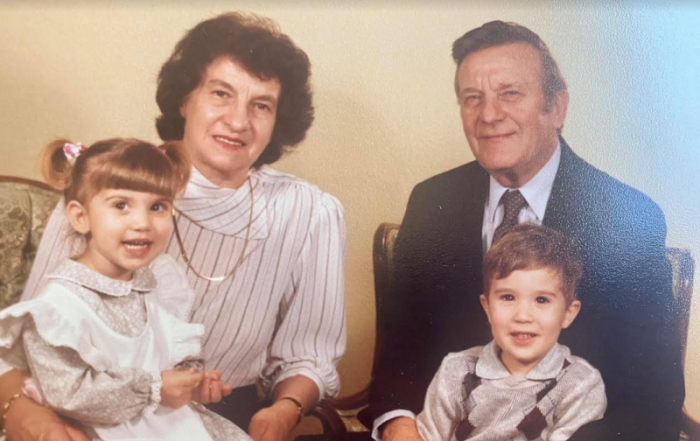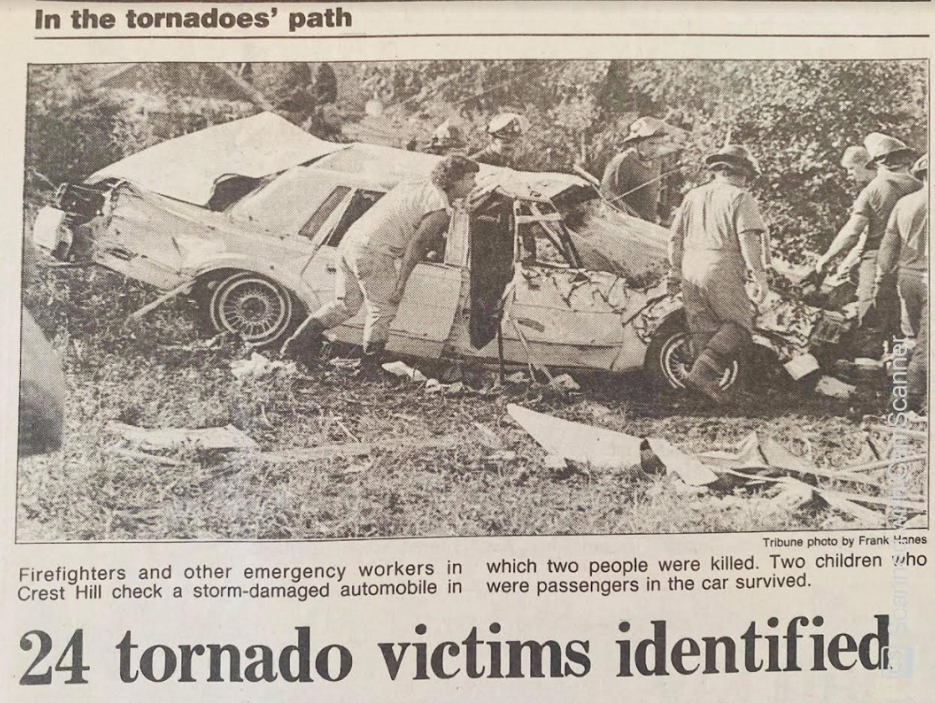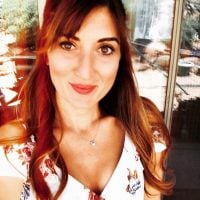
I woke up one particular morning in late August a happy, normal, seven-year-old child, not realizing the events that would take place later that afternoon—events that would change the trajectory of my life forever.
It was a muggy, hot, and sticky summer day in Illinois. My grandparents picked my brother and I up in their shiny, new white Lincoln town car. They were so proud of that car.
My grandparents met in Belgium during WWII in the little town my grandmother was from when my grandpa fought as an American solider. He became a regular at the little bar and cafe my great grandmother owned. They became friends and he would teach her English in exchange for her teaching him French. That’s when my great grandmother told him there was someone she wanted him to meet, her daughter Alida. They fell in love, got married, and after my uncle and then father were born, they relocated back to America where they started a small grocery store and deli, worked like crazy, and lived out the “American Dream.”
We were the first grandchildren for my dad’s parents—and the apples of their eyes. We were spoiled rotten by them, but in all the best ways. It was the last day of summer before the dreaded first day of school, so we spent the day playing and swimming at the Elks pool, where they frequented.
It was an afternoon that started off with amazing childhood memories. I remember being with my sweet grandma, who was wearing her matching yellow swimsuit and swim cap, playing in the shallow end, while my grandpa slowly eased my brother into the deep end of the pool like a big boy. We reluctantly had to leave our day of swimming a little early so my grandparents could get to a dinner party they had previously planned that evening.
I’ll never forget the sky as we left and walked toward the car. It was eerie. The air was still and there was a hint of green in the sky. It was a perfect indication that a summer thunderstorm was on its way.
My grandparents hurried us to the car to get home. Once we reached the car, my brother asked to sit shotgun—he always loved being up front with our grandpa. My grandma and I sat on opposite sides in the backseat, me directly behind my big brother. As we got into the car, I asked my grandma to please put on her seatbelt. She leaned over and smiled and said, “No sweetheart, adults don’t need to wear seatbelts, but kids do.” She then buckled mine as she kissed me on the forehead.
We started down the road. But what we didn’t know as we traveled down that road heading home was that we were straight in the path of a massive tornado that was forming miles in front of us. We would soon be at the perfect wrong place, at the perfect wrong time. It would later be known as the Plainfield Tornado, the largest F5 tornado on record to rip through our town. It was a storm that came with no warning, and no sirens.
The rest of the story has replayed in my head a thousand times over the years. We headed down that straight Midwestern road, and first, came the rain. Within minutes the sky turned incredibly dark. It was midafternoon and suddenly felt like it was evening time with dark clouds rushing around us. I was a little confused and scared by the darkness.
Then seemingly out of nowhere was the sound of massive hail denting the roof of our town car. It was so loud and sounded like softballs being thrown at the top of the car. I remember being so scared at the crashing noise, but I was trying to stay brave. Then came the thunder and lightning. Under normal circumstances, there is a break between the two, but I remember them coming together in intense synchronicity that shook our whole car.
I was no longer able to stay brave. I was scared and started crying, as I’d never experienced anything like that before and knew something wasn’t right. Within seconds, the wind came. First it was a couple garbage cans that were picked up and tossed across the street in front of us. Next, an entire garage lifted off its foundation and traveled through the sky in what seemed to be slow motion. It was mere minutes from the time the rain started as we drove down the road before it was too late.
My grandma and I looked out our back left window, and at the end of the road coming straight for us was a giant wall of a tornado with swirling rain and hail taking out houses on both sides of the street. It wasn’t a funnel, like a typical tornado I’d seen in pictures; it was a giant wall of dark clouds swirling and heading right at us. It was the scariest moment of my entire life.
My grandmother gasped, “It’s a tornado!”
My grandparents yelled back in forth in French over the intense noise from wind, hail, and thunder, and I couldn’t make out what they were saying. But I do remember my grandfather asked if he should pull over, or what he should do. Before my grandmother could answer, our car was picked up just like the little trashcans we saw getting carried in front of us moments before.
I remember feeling a strong jolt. I remember throwing up and spinning. And the next moment, I woke up in a field in the back of our mangled car. I remember the smell, and later in life, anything that resembled that smell would trigger me into instant panic. It was the smell of gasoline, grass, dirt, and blood. Thankfully, that smell doesn’t come up too often.
From where we were picked up, our car was thrown 300 feet, rolled six times, and ended up in a field. They clocked the winds at over 300 mph. That tornado left a 16.4-mile-long damage path, which ranged from 600 yards to half a mile in width, destroying hundreds of homes, injuring 350 people, and claiming the lives of 29 people—including my sweet grandparents.

I woke up to my brother calling out my name. He had survived, although I could barely see his face through all the blood and debris—the windshield had come down on him and scalped his head. My grandmother, not wearing her seatbelt, was on my brother’s lap in the front seat. It was a gory, horrific scene to wake up to. I was in shock, but went into survival mode knowing my brother was still alive and needed help. My mission was to save him.
I couldn’t tell right away that my grandparents were no longer alive, but I knew they were not moving. Those images are forever engrained with me. Somehow I managed to escape the backseat of our mangled car with nothing but a broken pinkie finger, cuts and bruises, and some rocks, glass, and grass embedded in my skin. I punched through the broken glass of the back window and crawled out of the car. I then ran as fast as I could through the field for help.
That was the last time I ever saw my grandparents.
After running up to houses and frantically trying to find help, two men ran to me from an apartment complex. I remember them asking me where I’d just come from. When I pointed to what was left of our car in the field, they looked at me in complete disbelief. I said that my grandparents and brother were still in the car and my brother needed help. One ran toward the car as the other ran me to an apartment building where the top two floors had been ripped away, and handed me to a woman who would take me inside. The top floor looked so strange with exposed bedrooms and debris, just open to the sky. I later learned that eight people lost their lives in that apartment.
An array of amazing strangers bandaged me up, changed my shirt, and ran to my brother’s aid. Everyone was telling their stories of where they were when the tornado came through. One women said she was in the shower. I don’t think I said a word to anyone while they picked out the bigger pieces of glass from my skin and took wet towels to wash off the dirt and blood.
The only time I spoke was when they said they were taking me to an ambulance. I stared screaming no and crying hysterically, and told them I wouldn’t leave my grandparents and brother. They assured me my brother was in the ambulance already. I was placed on the bed where my brother was bandaged up from head to toe, and was handed a teddy bear. I clenched onto that bear as if it was the only thing keeping us all alive. There were at least three other people packed into the ambulance with us, but my brother was the only one laying down. I couldn’t look at them, so I focused on my bear and my brother.
The next few weeks were are a blur. I remember social workers sitting with me before my parents could find us. My aunt was the first one to get to us at the hospital, which looked and felt like a warzone; and I remember when my parents arrived, rushing toward us. I remember being separated from my brother, as he underwent emergency surgeries and a long recovery process while I stayed at my aunt’s house. I remember my parents coming to check on me in between hospital visits with my brother. And I remember, shortly after, being at my grandparents’ funeral with my pinkie in a sling and my brother in a wheelchair with a broken leg and his head bandaged up.
I felt so lost, confused, and empty. I was devastated that two people I loved the most were just taken from me. And I was unable to process the thought that they wouldn’t be coming back. I was scared and traumatized, but all I could do was try to keep a brave face.
It might seem obvious that my brother and I would suffer from post-traumatic stress disorder (PTSD). But at that time, we all went into survival mode. While my parents were thankful that we were alive, they were also dealing with their own trauma, especially my dad, who was grieving the loss of both his parents.
I remember being extra quiet during that time and trying to survive the chaos. And I don’t ever remember talking about the loss of my grandparents with my parents, or even the accident itself, until much later in life. Back then, they didn’t really know the name for PTSD, or if they did, they didn’t know it as anything other than what soldiers suffered from coming back from war. We just survived, day by day, and focused on my brother’s recovery. We tried to move on with life. For lack of a better term, the tornado and the loss of my grandparents were essentially swept under the rug in order to move on. I don’t think I wanted to bring it up to my parents, and I don’t think they wanted to bring it up to me, thinking that we could all move on easier if we just didn’t talk about it.
My brother, after realizing that wearing our seatbelts was what saved our lives, went on to be a crusader for seatbelt safety. We did interviews on local TV shows and he shared his story. When interviewers would ask me about what happened that day, I would try to run away from them. I couldn’t talk about it and my silence was the only way I could move on. The trauma was too fresh and the images of waking up in the backseat of the car would come flooding in anytime someone asked me a question.
Something that we didn’t know at the time is that trauma, when not processed, sticks with you. It’s not just something that can be “swept under the rug.”
PTSD came later, in the form of my brother putting a helmet on his head and running to the basement every time it would rain. I would be panicked as well, but I always put on a brave face. That was just the way it was. Our solution was to move from Illinois to Arizona, where there were no tornados and we could feel safe. And that brave face mentality stuck with me throughout my life.
PTSD also came in the form of a panic attack the first time I drove myself through a carwash. The loud noise in the car and the air dryers at the end strangely sound a lot like the wind of a tornado. Oddly enough, I didn’t fully make the correlation of my hatred and panic in automatic car washes until later. I just knew I hated them.
PTSD also came in the form of nightmares when I was away at college that turned into all night panic attacks and insomnia. I would call my brother at 3 a.m., mid panic attack on any given night, just to make sure he was okay. He always answered and always understood why; then we would talk ourselves through it until the next one came around.
PTSD also came in the form of crippling anxiety in my 20s that I never quite understood.
PTSD also came in the form of my brother calling me after pulling over on the side of road in his 30s when the rain and wind he was driving through put him in such a panic that he couldn’t breathe. I’d also call him or my parents from a parking lot when I wasn’t able to drive home due to monsoon-like wind and rain. We would, again, talk through it until the panic attack stopped and I was able to drive. Then we’d go on with our lives and never talk about it to anyone else, because they just didn’t get it.
It wasn’t until college and my Psychology 101 class that I learned about PTSD, and how both my brother and I had so many relatable symptoms. I became enamored with psychology and ended up earning my degree in it as a result. I suppose it was a pretty expensive route to finally getting some of the self-help that I needed. But it wasn’t until years later, when I sought a therapist for a separate experience, that I realized how much that traumatic childhood experience had been affecting my brother and I our whole lives. Until then, I hadn’t realized that I didn’t have to live my life in constant states of fear and anxiety. That I could receive help, and finally process and overcome the trauma.
I’ve seen therapists on and off now for over 10 years, and I’m incredibly thankful for it. I recently began receiving EMDR (short for Eye Movement Desensitization and Reprocessing), and it has changed my life for the better. Essentially EDMR therapy “facilitates the accessing and processing of traumatic memories and other adverse life experiences to bring these to an adaptive resolution making negative association, and physiological arousal reduced.” In other words, I am now able to tell my story of that day without feeling the panic that would typically come up with it, even 30 years later. I’ve been able to process the trauma and effectively overcome it.
We all have aspects of trauma in our lives. Of course, not all traumas are as intense as watching your grandparents die in front of you in a tornado, nor do they need to be to seek help and lead a better life. Whatever your trauma may be, if left unprocessed and not dealt with, you will carry that trauma with you and it will find ways to enter and affect your life. This is something it took me a long time to realize, and to no fault of my parents—they are amazing, loving, and supportive—but they grew up in a generation where a common thought was that therapists were someone only crazy people had to see. And we weren’t crazy.
My story is now one of surviving and overcoming, and one that I can only hope gives me a little street cred at least. Why go through such a trauma if you can’t share the story and help others? It was an unimaginable tragedy, but one that we are alive to tell. And because I sought help and learned to process the trauma, I’m able to tell it without the anxiety and PTSD associated with it, and with all the power I need to overcome.
I now like to remember my grandparents for the amazing lives they led and the people they were, and not just remember them for the tragic way they died. I feel like I can finally move on from the trauma of that day and replace it with strength. My hope in sharing this story is to destigmatize conversations around mental health and seeking help for past or current traumas. There is a better way to live, and help is available to us all, no matter how long it takes us to get there.
And once our traumas are processed, a better life is waiting at the end of that tunnel.
~
AUTHOR: REBECCA RIFFEL
IMAGE: AUTHOR'S OWN

Read 13 comments and reply